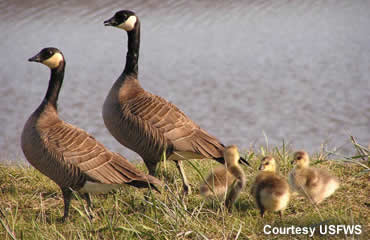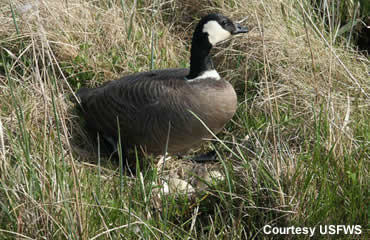If you live in an urban or rural area, the sight of a gaggle of Canada geese is not unusual.
That wasn’t always the case. In 1982, fewer than 500,000 resident Canada geese lived in America, according to the U.S. Fish and Wildlife Service. A relatively recent count taken in 2012 reveals an obvious change, and some 3.8 million Canada geese now live in the United States permanently.
Some see them as a majestic sight against the sky, honking their way from one location to another. To others, the Canada goose and its droppings are nothing more than an annoying nuisance.
Perhaps this is because Canada geese can’t read “Keep off the Grass” signs. They would rather eat the grass, and then leave droppings.
They are highly adaptable birds and can live and dine in a variety of locations, from developed areas like suburban neighborhood ponds, office complexes and parks to open farmland and rural reservoirs.
Their primary food is tender, high-in-protein grass, the kind of grass that grows on golf courses, lawns and in parks. Other foods geese love are young shoots and leaves, so farmlands are also attractive and draw them.
The geese live year round in their southern breeding range which includes the western and eastern coasts of America, as well areas ranging from southern states and northern Mexico. They migrate farther south during winter months.
So, what can an irritated home owner, business owner or farmer do?
 There are several solutions, but the Canada goose is protected by federal law. That means they cannot be harmed without the permission of the USFWS, something the agency frequently grants permission for in urban and suburban areas.
There are several solutions, but the Canada goose is protected by federal law. That means they cannot be harmed without the permission of the USFWS, something the agency frequently grants permission for in urban and suburban areas.
Some states have noticed that any increase in the goose population, especially in urban areas, typically brings an increase in nuisance complaints, but they also have some solutions, such as those from the Georgia Department of Natural Resources Wildlife Resources Division.
“Geese that have adapted to people, either because they are being fed or because they are so close to humans on a daily basis, can become aggressive,” says Greg Balkcom, state waterfowl biologist for the Georgia’s Wildlife Resources Division.
“When you have resident geese nesting near developed areas like office complexes or apartment buildings, the geese will defend their nest against all intruders, and that includes chasing or charging people.”
 That’s natural goose behavior. But harassment can work two ways.
That’s natural goose behavior. But harassment can work two ways.
Georgia advises landowners who don’t want geese on their property to first try a variety of techniques, such as chemical repellents, mylar balloons, wire and or string barriers, and noise makers. These methods are proven to help reduce goose problems.
The methods require consistency from the property owner, and are not always 100 percent effective. Spring is the best time to act because geese are just beginning to select their nesting sites. Frightening geese away in spring months helps reduce problems in the future.
Another possibility is to reduce goose reproduction. The USFWS regulations allow for additional control measures, apart from harassment techniques and traditional hunting, to help address nuisance goose problems.
One such regulation is a permit for reducing goose reproduction through nest and egg destruction or egg addling or oiling which prevents the eggs from hatching.
“A permit is easy to attain, and can be useful in certain situations – such as a homeowner who may have geese nesting close to home,” Balkcom says. “Additionally, it is a way to keep a minimum number of adult geese on the property without the population growing too large through years of unchecked reproduction.”
The permits are available by clicking here.
The USFWS website also contains useful information on the methods for addling or oiling the eggs or destroying the nests and when each method may be appropriate. Because the nesting season for geese is just getting underway, landowners and land managers who have problems with geese, especially during the summer molting season, may be able to act now and reduce their nuisance problems later this year.
It is important to remember that Canada geese are a protected species under state and federal laws. It is illegal to hunt, kill, sell, purchase or possess Canada geese except according to Georgia's migratory bird regulations.
For a brochure on a variety of methods of dealing with nuisance geese, click here.
—Georgia Department of Natural Resources Wildlife Resources Division